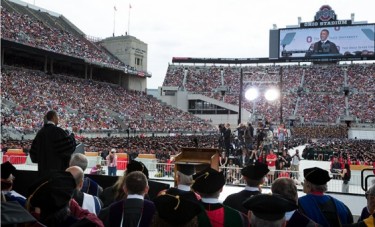This article by Rachel Wang originally appeared on Tea Leaf Nation on May 13, 2013 and is republished as part of a content sharing agreement [Format adapted to facilitate translation].
Last week, a speech by U.S. President Barack Obama on the value of engaged citizenship made waves in Chinese social media.
Influential Sina Weibo user @假装在纽约, or “pretending to be in New York,” a widely followed provocateur who frequently tweets about the U.S. and whose account has more than 470,000 followers recommended [zh] the speech to Chinese youths:
奥巴马昨天在俄亥俄州立大学的毕业典礼上演讲,演讲的核心是“公民意识”。我把他的演讲稿匆匆翻译了下来,就是觉得,中国的年轻人,也许更应该接受这样在中国的课堂里接受不到的教育。
The core of Obama’s speech yesterday at the Ohio State University Commencement is ‘a sense of citizenship, I roughly translated his speech, because I feel that Chinese youth may perhaps be even more in need of this kind of education, which they do not receive in Chinese classrooms.
In his commencement speech on May 5, President Obama said, ”We are not a collection of strangers…we are bound to one another by a set of ideals and laws and commitments.” ”Pretending to be in New York’s” post, together with his translation of the speech, attracted over 30,000 retweets and nearly 6,000 comments in about two days.
Though this is not the first time that Chinese netizens have compared the circumstances of China and the U.S., the concept of “citizenship” has stirred yet another round of discussion about the rights and responsibilities of the Chinese people, as well as criticism of the government. Yin Hong (@尹鸿), executive dean of the Tsinghua School of Journalism and Communication, commented [zh]:
虽然不算是一篇最好的讲演,但公民意识表述很清楚:每一个人都拥有天赋人权,所以每一个人也都具有天赋义务。这就是公民。没有人权,就就不能有义务。权力和义务是相对对等的。
Though this is not the best speech, ‘citizenship awareness’ has been described very clearly: everyone has natural rights, so everyone also has natural responsibilities. This is citizenship. Without human rights, there should be no responsibilities. Rights and responsibilities go hand in hand.
Another Weibo user, “Once very fat” (@曾经的胖胖胖胖), wrote:
为什么中国人缺少公民意识,因为他们不觉得这个政府跟他们有关系,而且事实上这个政府也的确不是来自选票……
Why do the Chinese lack a sense of citizenship? Because they don’t feel that this government has anything to do with them, and truthfully, the government is not an elected body.
“Dragon Ash” (@龙团一灰) commented [original Chinese post deleted],
[Being in] a socialist country, we cannot think about such things; the more you think about them, the worse you will feel. As for rights, whatever the civil servants say goes.
The sentiments apparent in the comments on Pres Obama’s speech went beyond envy, jealous and pity. They also included discussions about the struggles, difficulties, and bitterness that Chinese youth face today. Weibo user “Big Guy Moving Like Dragon and Tiger” (@大背头龙行虎步 wrote [original Chinese post deleted]:
The youth all start out hoping for a sense of citizenship, but after hitting the wall over and over again in society, they turn towards nepotism. This is ‘soy-sauce vat’ China, where everything ends up black [corrupt] regardless of how it started out. One generation after another, this is our traditional culture: dictatorship, authoritarianism, and intolerance of opposition. The burdens of tradition are way too heavy; democracy might be another century away.
User “Hula Baopei” (@呼啦啦啦宝宝_佩) mused:
当国内大学生一毕业便面临高房价、物价而不得不屈服于现实失去梦想时,美国青年却可以以祖国未来为己任,被赋予强大的公民意识,坚定不移的实现自己的梦想、承担国家发展之重任,我在想中国的未来在哪里?下一代的未来在哪里?
While Chinese college graduates succumb to reality and lose their dreams in the face of high prices and unaffordable housing right after college, American youth can make the future of their country their personal mission; they’ve been endowed with a strong sense of citizenship, they hold fast to their dreams, and they take the responsibility for the nation’s development. I am wondering, where is China’s future? Where is the future of the next generation?
Such concerns might just be timely, with graduation right around the corner for many in China. Perhaps for most recent college graduates, the most pressing issue facing them is not how to change the nation, but how to survive in a gloomy economy. In fact, 2013 is believed to be the most difficult job hunting season modern China has ever faced. While almost seven million college graduates are entering the job market, only nine million new jobs have been created, and college graduates must compete with returning students from abroad, as well as high school graduates and trade school graduates. The ratio of college graduates to jobs is believed to be the lowest in Chinese history [zh].
A sense of citizenship may mean more than thinking independently and forming opinions that differ from the propaganda of the Chinese government. More importantly, it represents an ability to be balanced and independent when facing authority, an ability that flows from the feeling of being an influential part of the country, however small the individual may be. As Ren Zhiqiang (@任志强), a real estate tycoon with more than 14 million followers on Weibo, opined [zh],
总统的讲话从来不是必须学习的圣旨。而是一种常识。
The president’s speeches have never been edicts that all are required to study, but simply common sense.








1 comment